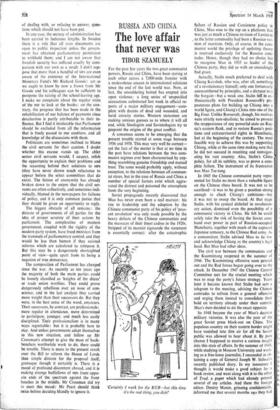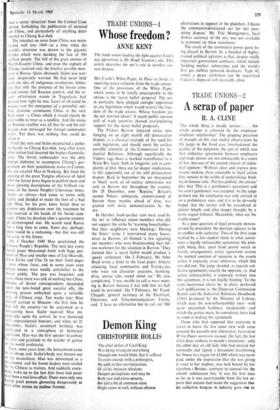The love affair that never was
RUSSIA AND CHINA
TIBOR SZAMUELY
For the past few years the two great communist powers, Russia and China, have been staring at each other across a 7,000-mile frontier with a malevolence unseen in international relations since the end of the last world war. Now, at last, the smouldering hatred has erupted into open violence: a long series of unspecified accusations culminated last week in official re- ports of a major military engagement—com- plete with dozens of dead and wounded, and lurid atrocity stories. Western statesmen are making anxious guesses as to where it will all end, while Sinologists and Sovietologists try to pinpoint the origins of the great conflict.
A consensus seems to be emerging that the present trouble started at some stage between 1956 and 1958. This may very well be correct— yet the fact of the matter is that at no time in the past have relations between the two com- munist regimes ever been characterised by any- thing resembling genuine friendship and mutual trust. The same would probably apply, without exception, to the relations between all commun- ist states, but in the case of Russia and China a number of special factors exist which aggra- vated the distrust and poisoned the atmosphere from the very beginning.
Soviet propaganda recently discovered that Mao has never even been a real marxist: his rise to leadership and the adoption by the Chinese communist party of his policy of 'peas- ant revolution' was only made possible by the heavy defeats of the Chinese communists and the massacre of their finest cadres in the 1920s. Stripped of its marxist rigmarole the statement is essentially correct: after the catastrophic 'Certainly I work for the KGB—but this titne it's the real thing, you dish!' failure of Russian and Comintern policy in China, Mao rose to the top on a platform that was just as much a Chinese revision of Leninism as the latter commodity had been a Russian ver- sion of marxism. Only, of course, in the com- munist world the privilege of updating theory is reserved exclusively for the Russian com- rades. Hence, though they had no choice but to recognise Mao in 1935 as leader of the Chinese party, they did so with an exceedingly bad grace.
Actually, Stalin much preferred to deal with Chiang Kai-shek, who was, after all, something of a revolutionary himself; only one fortunately unencumbered by principles, and a dictator into the bargain—but a weak one. Stalin fell in en- thusiastically with President Roosevelt's pre- posterous plans for building up Chiang into a world figure, and Chiang's China into one of the Big Four. Unlike Roosevelt, though, his motives were strictly non-idealistic; he aimed to prevent the reappearance of any powerful state on Rus- sia's eastern flank, and to restore Russia's posi- tions and extraterritorial rights in Manchuria, lost at the beginning of the century. The most feasible way to achieve this was by supporting Chiang, while at the same time making sure that he did not succeed in reuniting and reinvigor- ating his vast country. Alas, Stalin's China policy, for all its subtlety, was to prove a com- plete failure. The instrument of its frustration was Mao Tse-tung.
In 1945 the Chinese communist party repre- sented for Stalin no more than a valuable figure on the Chinese chess board. It was not to be sacrificed—it was to be given a position strong enough to check Chiang's ambitions—but it was not to sweep the board. At that stage Stalin, with his cynical disbelief in revolution- ary action, dismissed even the possibility of a communist victory in China. He felt he could safely take' the risk of having the Soviet army hand over power in part of Russian-occupied Manchuria, together with much of the captured Japanese armoury, to the Chinese Red army. As a concomitant Stalin advised Mao to lie low and acknowledge Chiang as the country's legal head. But Mao had other ideas.
The civil war between the communists and the Kuomintang reopened in the summer of 1946. The Kuomintang offensive soon petered out and the Red forces began going over to the attack. In December 1947 the Chinese Central Committee met for the crucial meeting which was to map the party's future strategy. Years later it became known that Stalin had sent a telegram to the meeting, advising the Chinese comrades to refrain from a general offensive and urging them instead to consolidate their hold on territory already under their control. Mao's men decided to do the exact opposite.
So 1948 became the year of Mao's decisive military victories. It was also the year of the great Soviet press black-out on China. The populous country on their eastern border might have vanished into thin air for all the Soviet public was allowed to hear about it. By pure chance I happened to receive a curious insight into this state of affairs. In the summer of 1948. while studying in Moscow University and work- ing as a free-lance journalist, I succeeded in ob- taining a copy of General Joseph W. Stilwen recently published diary. In my innocence thought it would make a good subject for a book review, and went along with It to the othce of Trud, a paper which had already printed several of my articles. And there the foreign editor, Dmitry Monin, grinning confidentially. informed me that several months ago they had
had a secret 'directive' from the Central Com- mittee, forbidding the publication of material on China, and particularly of anything detri- mental to Chiang Kai-shek.
The interdict on news from China was main- tained well into 1949—at a time when the
world's attention was drawn to the gigantic battles which were deciding the fate of 500 million people. The fall of the great centres of North-Eastern China, and even the capture of Peking, received only the briefest possible men- tion in Russia. Quite obviously Stalin was wor- ried —desperately worried. He had never held with the idea of indigenous revolutions; believ- irp, that only the presence of the Soviet army could ensure full Russian control, and the re- cent unfortunate events in Yugoslavia had prosed how right he was. Least of all could he rejoice over the emergence of a powerful, uni- fied. dynamic communist China at his very back door—a China which it would clearly be impossible to treat as a satellite. And the status of Russian satellite was all that he and his col- leagues ever envisaged for foreign communist states. Yet there was nothing they could do about it.
Until the very end Stalin maintained a pathe- tic loyalty to Chiang Kai-shek, long after every other nation had deserted the hapless Generalis- simo. The Soviet ambassador was the only foreign diplomat to accompany Chiang's gov- ernment on their penultimate move to Canton; the rest awaited Mao in Nanking. But from the opening of the great Yangtsc offensive of April 1949 the Soviet press began to publish more and more glowing descriptions of the brilliant vic- tories of the heroic People's Liberation Army. Stalin—as always—had come to terms with reality and decided to make the best of a bad job. Mao, for his part, knew better than to express any displeasure over the treatment he had received at the hands of his Soviet com- rades. China lay desolate after a quarter-century of uninterrupted war. He would need Russia for a long time to come. Some day, perhaps, there would be a reckoning—but that was still far away in the future.
On 1 October 1949 Mao proclaimed the Chinese People's Republic. The next day every Soy let paper blossomed forth with huge por- traits of Mao and smaller ones of Liu Shao-chi, Chou En-lai and Chu Te on their front pages —men whose faces, and in some cases even whose names were totally unfamiliar to the Soy iet public. The past was forgotten, and ewrywhere there was talk of nothing but China. Hordes of Soviet correspondents descended upon the new-found great socialist ally; the Printing presses embarked upon a veritable orn of Chinese copy. Ten weeks later Mao himself arrived in Moscow—the first time he had left his country—to be acclaimed as a conquering hero. Stalin received Mao im-
mediately .upon his arrival; he was showered
With unprecedented honours; and when, on 21 December, Stalin's seventieth birthday was celebrated in a atmosphere of hysterical adulation, Mao was the first speaker to convey his love and gratitude to the teacher of genius of the world proletariat. Then, some years later, the honeymoon came to an abrupt end. Stalin'gtody was thrown out
of the mausoleum, Mao was denounced as a
des iationist and the Soviet leaders were reviled by the Chinese as traitors. And suddenly every- bodY woke up to the fact that there had never yen been a real love-affair. There were only two ostile great powers glowering dangerously at ach other across an endless frontier.



































 Previous page
Previous page